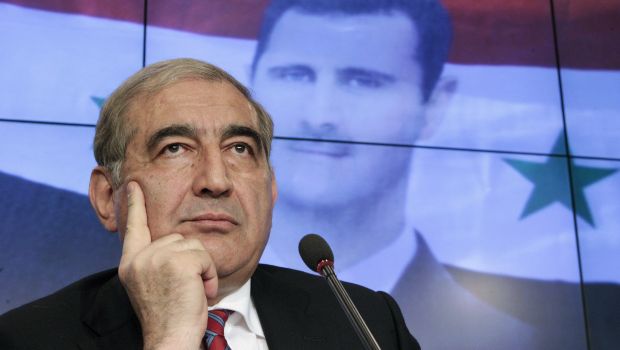
Syria’s ex-Deputy Prime Minister for Economic Affairs Qadri Jamil listens during a news conference in Moscow, in this August 21, 2012 file picture (REUTERS/Maxim Shemetov/Files)
London, Asharq Al-Awsat—Syrian president Bashar Al-Assad fired his deputy prime minister Qadri Jamil on Tuesday, citing unauthorized contacts with foreign diplomats and absence from his post.
A statement on Syrian state TV said: “Jamil was dismissed because he left his center of work without prior permission and did not follow up on his duties… Additionally, he undertook activities outside the nation without coordinating with the government.”
According to reports, Jamil met with US ambassador to Syria Robert Ford in Geneva on October 26, in order to discuss the peace conference expected to take place in the city at the end of November.
One anonymous diplomatic source told the Reuters news agency that during his meeting “Jamil put forward what Ford apparently regarded as unworkable proposals regarding the Geneva talks. He also unsuccessfully tried to win US backing to including him on the opposition side in the Geneva talks.”
A statement from the US State Department confirmed that Jamil had met with the US envoy for Syria over the weekend, but did not give detail as to what was discussed.
“We meet lots of Syrians of all political backgrounds. We’re not going to give a list, but we do regularly meet Syrians with direct contacts with the regime in Damascus. We do this because we want the regime and the opposition to achieve a political agreement as outlined in the Geneva Communiqué of June 2012,” the statement said.
Jamil himself also told Lebanese TV station Al-Mayadeen that he had met with Russian diplomats and said: “I am not an employee…I am a political activist.”
Although Jamil held the post of deputy prime minister, he is a member of a party opposed to Syria’s ruling Ba’ath Party government, one that was nevertheless allowed to continue to exist because it was not aligned with the rebels fighting to bring down the regime.
Amid speculation that the move represents reluctance on the part of Assad to take part in negotiations in Geneva, analysts speculated that Jamil’s dismissal was the result of attempts to position himself as a possible power-broker or leader in a post-Assad Syria, and the determination of Assad and his inner circle to keep tight control of the negotiations.
“It could be internal housekeeping to show any would-be plotters ‘do not plot behind my back,’ and so on. Or it could be a signal to the Russians and others that ‘you do this through me or not at all,’” said Dr Chris Phillips, a Syria expert at Queen Mary University of London.
“I think he [Assad] is not serious about giving up power, is how I perceive it. If he has to go to Geneva to play along with the Russians then he will do it…I think what we are seeing at the moment is a bit of a dance from the regime with regards to Geneva,” he added.
Andrew Bowen, a researcher on Syria at Rice University’s James A. Baker Institute for Public Policy, told Asharq Al-Awsat “I think Bashar is serious about negotiations, but he has removed anyone who potentially tries to negotiate beyond their brief to avoid anyone brokering a deal that goes beyond his terms.”
“His dismissal potentially is a result of conversations he should not have had, or a perceived strengthened position that would benefit Jamil and not Bashar,” he added.
David Butter, a Syria expert at the British foreign affairs think tank Chatham House, told Asharq Al-Awsat that Jamil’s departure was made more likely by the fact that he was viewed in Damascus as expendable.
“He was not that important a figure. He was kind of useful for a while when he could be presented as some kind of internal loyal opposition, but now that the political wind is blowing in Assad’s favor he was not needed any more. Maybe he got delusions about his own potential power,” he said.
